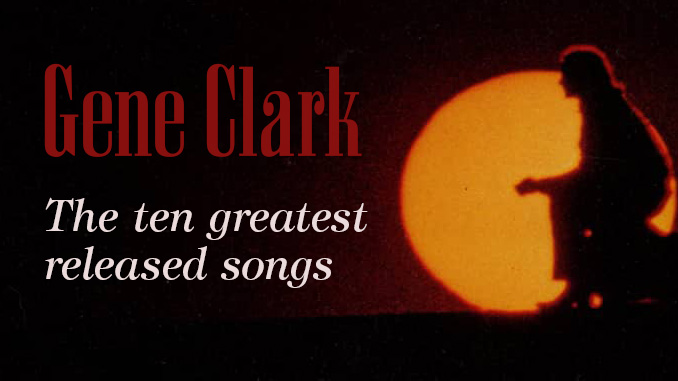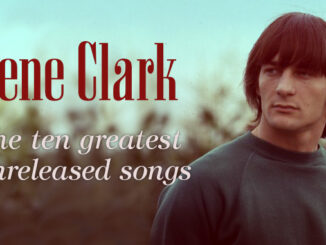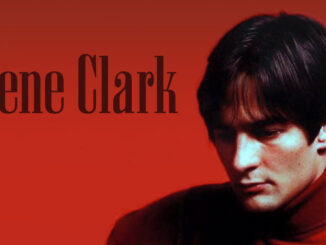
If you haven’t noticed the introduction, please read the first part of it (up to the paragraph about Marissa Nadler). Then you are on firm ground before listening to the favourites below.
Hear The Wind [1977]
The delightful but fragile Hear the Wind – descriptions that also fit Gene’s voice in this case – is simply so much better than almost all other music. The question is if this could be the apple of my eye in his giant catalogue? On Hear the Wind, we also find an excellent example of the intimacy, which I’ll be talking more about. You get the impression that he has filled his lungs with a lifetime worth of passion and suddenly let it all come out in one exhalation.
The lyrics deal with Gene’s marriage to Carlie McCummings, even though she claimed that he never wrote anything about her. Certain parts of the lyrics sound as they’ve been written from his perspective and one has to wonder how else could a voice express that much grief and pain?
Won’t Let You Down [1980]
The Byrds inspired Won’t Let You Down is simply an exuberant sixties pastische, enclosed in a timeless power pop sound. I get the feeling that Gene could have written more songs in the same vein anytime, but the buyers shouldn’t get away that easy.
Echoes [1966]
Echoes is an odyssey into Clark’s past; a chronicle in the wake of events since the early days of The Byrds.
Traditional verse, chorus and bridge structure are lacking, but that doesn’t matter when Leon Russell’s exciting arrangement leads Gene to unknown musical areas containing classical instrumentation, combined with his pensive, but nevertheless, stunning voice. The remix version from 1972 is maybe even more captivating.
Rain Song [1984]
Gene would not have been crowned King of Melancholy without a key song, fueled with minor tones and a romantic apocalypse. On Rain Song we get what we are looking for. In fact, it is almost too painful to listen to, but when the song fades too early, the listener still feels drained and betrayed.
She Don’t Care About Time [1965]
A distinguishing feature of She Don’t Care About Time is the interaction between solo and rhythm guitar. The sound is so vigorous and solid that it provokes the vision of Phil Spector entering the studio with a bunch of guitarists in tow. Add delicate harmony vocals and a structure without the standard verses / choruses to become overwhelmed by the capacity of this 20-year-old guy.
There are two completely different versions of She Don’t Care About Time, here (recorded in 1970, but released in 1973) and here (recorded in 1972, but not released until 2016) which are equally good.
Gypsy Rider [1987]
The lugubrious Gypsy Rider hasn’t got the customary Cm, Fm# or Gm chords, but Cm², Fm#² and Gm² chords instead. The song goes under the skin and causes you to tremble with pleasure and sorrow, when Gene’s voice, lyrics and music creates a vacuum-like condition that causes the outside world to stop. Gypsy Rider attacks the listener’s emotional epicenter and draws black edges around the speakers at the same time.
There’s also a TV appearance, where Gene looks more fresh than he does on the album cover. The following year, the English fanzine Bucketfull of Brains released a faster and maybe an even better version, if possible.
Silent Crusade [1977]
If there’s anyone who still doubts Gene Clark’s ability to invent new ways of approaching a song, do listen to the metaphysical expedition Silent Crusade. The spartan background, with acoustic guitar and organ as the main instruments and Gene’s tormented voice at the end as the crowning achievement, completes the album Two Sides to Every Story.
The Radio Song [1968]
The secret to the success of the album The Fantastic Expedition of Dillard & Clark is perhaps that it’s a classic songwriter approaching country music. Instead of leaning against tradition and feeling, Gene chooses to adopt a pop sensibility or a singer-songwriter’s musical frame as a reference. Being a great artist, Gene was always looking for crème de la crème, regardless of genre, and therefore he leans more towards melodies, combined with love to traditional country music.
That is even more accentuated on the sixth track, The Radio Song – an outstanding song with such a wide-ranging musical spectrum that it should have been able to attract fans of both pop and country.
Shooting Star [1973]
The closing track on the album Roadmaster, Shooting Star, is perhaps the masterpiece, which the listener realizes as soon as Gene’s gentle voice enriches the beautiful melody. The “Gene Clark pace” has rarely sounded more efficient! But still, the listener has no idea what to expect, until a magnificent bridge creates a mood that makes your heart beat just a little bit faster.
Something’s Wrong [1968]
The greatest, or at least the most beautiful song on the perfect album The Fantastic Expedition of Dillard & Clark, is the last track Something’s Wrong. Gene takes us back to his childhood when life was uncomplicated and innocent. Something’s Wrong is also enriched by Chris Hillman’s sublime mandolin solo.
Bubbling under:
American Dreamer [1971]
I Remember The Railroad [1973]
Why Not Your Baby [1969]
For A Spanish Guitar [1971]
Why Did You Leave Me Today [1987]
From A Silver Phial [1974]
Sister Moon [1977]
I’ll Feel A Whole Lot Better [1965]
Something About You [1984]
Life’s Greatest Fool [1974]



re Shooting Star ,it’s well worth hearing Sandy Denny ‘It’ll
take a long time’ the ending is similar to Shooting Star and is played by many of the same musicians eg Sneaky Pete etc
playing only weeks after recording with G.C.